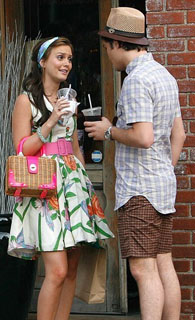
I'm a guy. I drive a beat up 1996 VW Golf, and sometimes I forget to shave. I guess you could say I'm not exactly the target audience of the CW's "Gossip Girl." But on Sept. 1, at approximately 8 p.m., I found myself in a room with three of my female friends, my eardrums throbbing with anticipatory squeals and giggles, sitting awkwardly and
waiting for the season premiere to start. Their gaze was boring a hole into the large TV screen, practically willing "Everybody Loves Raymond" to end and their show to begin. Then it happened—the screen went dim, "Raymond" ended, and with a flicker of light, "Gossip Girl" began.
addiction.
The series introduces viewers to a world in which rich kids from private New York high schools cruise around in limousines, jaunt down Fifth Avenue, attend highbrow parties where alcohol flows freely, and least important of all (for them at least)—attend high school.
Fans of the show are often criticized for being shallow and materialistic, but as junior Ruby Jang explains, it's purely for their entertainment.
"Their lives are just so messed up that it's great to watch," Jang said. "Their clothes [are stylish], and the way they deal with situations is so funny. It's a fantasy."
Although it would be much more exciting if fans had some sort of clinical distortion of reality, in reality, people who watch "Gossip Girl" are perfectly aware that the characters interact in an over-the-top world.
"Things [on the show] happen in such a dramatic and exaggerated way. It's cool to see how they deal with it," Jang said.
In a characteristically embellished fashion, the pilot episode shows high school juniors sitting in a limousine en route to a dance. They clink champagne glasses, and with alcohol sloshing onto their expensive gowns and designer suits, they make out with each others' dates, and take turns smoking a joint. This, in effect, sets an example for high school audiences.
"[The show] can have negative affects," Kristi Sackett, M.F.D. said. "It's exposing teenagers to things they know exist, [except] it looks easy in a show like this. It looks possible."
The show's audacious romances and heated betrayals awed viewers all throughout season one. Here's a quick recap: Serena van der Woodson returns to school from a year long absence after a previous, intoxicated tryst with her best friaend Blair Waldorf's boyfriend, Nate Archibald. Serena gets a new boyfriend, Dan Humphrey, and her friendship with Blair is restored. Things dissolve between Nate and Blair, and 20 minutes after they've broken up, she has sex with his best friend and resident sleaze Chuck Bass—in the back of a limo. Dan suspects Serena has cheated on him and is hiding the truth from hi and decides to break off the relationship.
"People love drama," Sackett said. "They get caught up in the lives of others, and enjoy gossiping when it's not about them. The experience of living through people vicariously makes [viewers] feel like they're part of 'Gossip Girl.'"
Perhaps the greater populace should stop thinking of the show as something comparable to the real world, and more like a view into some alternate reality where drugs and money are standard issue for teens.
"Their lives are a lot more complicated than ours," sophomore Angeline Yen said. "So they have different things to deal with because they're in a [luxurious] society."
So there you have it. I tried to psychoanalyze "Gossip Girl" only to find that there isn't much to psychoanalyze. My original ambitions of proving the unhealthy side-effects of the show have proven fruitless. Fans of "Gossip Girl" do not suffer from psychosis. They are in fact perfectly functioning members of society, and now, although I cringe saying it—I'm one of them.








